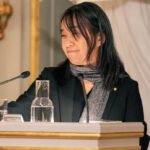By Porter Anderson, Editor-in-Chief | @Porter_Anderson
See also: UAE: Abu Dhabi Book Fair Announces Its Dates through 2030
An IPAF Shortlist is Scheduled for February 19
This year’s US$50,000 International Prize for Arabic Fiction longlist has been released today (January 7). That means the announcement arrives some three weeks later than it did last year—but perhaps this will put all the inflection points of this year’s contest into a single calendar year, the wise choice for coherence.
 It’s a weighty list, at 16 titles. Fully 10 longlistees will be dismissed before the February 19 shortlist announcement of six titles will be made.
It’s a weighty list, at 16 titles. Fully 10 longlistees will be dismissed before the February 19 shortlist announcement of six titles will be made.
Following the release of those shortlistees, the program is to name its winner on April 24 in Abu Dhabi shortly before the opening of the Abu Dhabi International Book Fair, which runs April 26 to May 5.
The longlist this year has been drawn by jurors from an origional pool of 124 submissions, by comparison to last year’s 133 titles.

The 2024 International Prize for Arabic Fiction (IPAF) was won by the jailed Palestinian writer Basim Khandaqji. Image: IPAf, Khéridine Mabrouk
The longlisted authors are from eight countries, with four each coming from Egypt and Syria; three from Lebanon; and one each from Algeria, Bahrain, Iraq, and Mauritania.
The longlisted writers are aged between 35 and 79 years. Four of the authors named today have been either long- or shortlisted by the program in the past.
This year’s jury comprises:
- Egyptian academic Mona Baker (chair)
- Moroccan academic and critic Said Bengrad
- Emirati critic and academic Maryam Al Hashimi
- Lebanese researcher and academic Bilal Orfali
- Finnish translator Sampsa Peltonen
The 2025 International Prize for Arabic Fiction Longlist
As usual, the program’s organizers have helpfully presented the longlist to members of the news media with authors listed alphabetically by surname.
| Author | Title | Country of Origin | Publisher |
| Aqeel Almusawi | The Weepers | Bahrain | Takween – Kuwait |
| Inam Bioud | Houwariya | Algeria | Dar Mim |
| Rashid al-DAif | What Zeina Saw and What She Didn’t | Lebanon | Dar Al Saqi |
| Ahmed Fal Al Din | Danshmand | Mauritania | Masciliana |
| Jan Dost | The French Prisoner | Syria | Dar Al Saqi |
| Sausan Jamil Hasan | Heiress of the Keys | Syria | Al-Rabie Publications |
| Iman Humaydan | Songs for the Darkness | Lebanon | Dar Al Saqi |
| Azher Jirjees | The Valley of the Butterflies | Iraq | Dar al-Rafidain |
| Hasan Kamal | TheStolen Novel | Egypt | Diwan |
| Taissier Khalaf | The Andalusian Messiah | Syria | Al-Mutawassit |
| Ahmed Al-Malawany | Happy Dreams | Egypt | Kotopia |
| Mohamed Samir Nada | The Prayer of Anxiety | Egypt | Masciliana |
| Nadia Najar | The Touch of Light | United Arab Emirates | Al-Mutawassit |
| Haneen Al-Sayegh | The Women’s Charter | Lebanon | Dar al-Adab |
| Sumar Shihada | My Life Has Just Begun | Syria | Dar al-Karma |
| Ayman Ragab Taher | The Lamplighter | Egypt | Kayyan |
Suleiman: ‘Exploring the Past to Comment on the Present’
In his customary comment on the release of the longlist, the University of Cambridge’s Yasir Suleiman, chair of the International Prize for Arabic Fiction board, is quoted this morning, saying, “This longlist continues the trend of recent years of exploring the past to comment on the present from multiple perspectives.

Yasir Suleiman
“Weaving the personal and generational into narratives that unfold through anxious and troubled times highlights the slow march of social and political change in Arab society.
“Some of the novels on the list paint a dystopian world in which every avenue is a cul-de-sac. Others reveal the oppressive force of tradition or the principled resistance to wanton attempts at knocking down well-deserved reputations.
“The diversity of the 16 writers in age, gender, nationality, places of residence, and length of immersion in the literary scene is a testimony to the strength and vitality of modern Arab culture.”
Disambiguation: Not ‘the Arabic Booker’
For clarification, the International Prize for Arabic Fiction sometimes is called “the Arabic Booker,” but the program’s organizers have said they’re ready to see the end of the misinformation of that terminology.
 While it was initially mentored by the Booker Prize Foundation in London, the International Prize for Arabic Fiction’s organizers stress on their site that the Arabic Booker phrase is “not instigated nor endorsed at all by the International Prize for Arabic Fiction or the Booker Prize Foundation, which are two completely separate, independent organizations.” The program goes on to put it even more bluntly, writing that the International Prize for Arabic Fiction “is not in any way connected with the Booker Prize,” italics ours.
While it was initially mentored by the Booker Prize Foundation in London, the International Prize for Arabic Fiction’s organizers stress on their site that the Arabic Booker phrase is “not instigated nor endorsed at all by the International Prize for Arabic Fiction or the Booker Prize Foundation, which are two completely separate, independent organizations.” The program goes on to put it even more bluntly, writing that the International Prize for Arabic Fiction “is not in any way connected with the Booker Prize,” italics ours.
 In an interesting cooperative measure, the International Prize for Arabic Fiction again this year is sponsored by the Abu Dhabi Arabic Language Centre, which under the direction of Dr. Ali Bin Tamim produces the larger Sheikh Zayed Book Award, with its 7.8-million-dirham purse (US$2.1 million), annually recognizing winning books in nine categories and a “Cultural Personality of the Year.”
In an interesting cooperative measure, the International Prize for Arabic Fiction again this year is sponsored by the Abu Dhabi Arabic Language Centre, which under the direction of Dr. Ali Bin Tamim produces the larger Sheikh Zayed Book Award, with its 7.8-million-dirham purse (US$2.1 million), annually recognizing winning books in nine categories and a “Cultural Personality of the Year.”
The Cultural Personality honor includes a purse of 1 million dirhams (US$272,262).
Both of these award programs make generous efforts in funding translation of Arabic content into other languages.
More from Publishing Perspectives on the International Prize for Arabic Fiction is here, and more on publishing and book prizes in general is here. More on translation is here, and more on Arabic in the publishing world is here. More on the Abu Dhabi International Book Fair is here, and more on the Abu Dhabi Arabic Language Centre and the work of Bin Tamim is here.
Publishing Perspectives is the world media partner of the Sheikh Zayed Book Award and the Abu Dhabi International Book Fair.
About the Author





